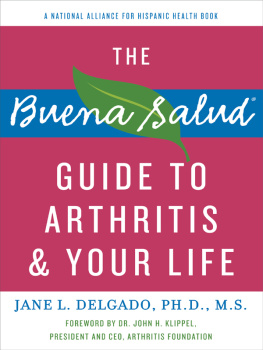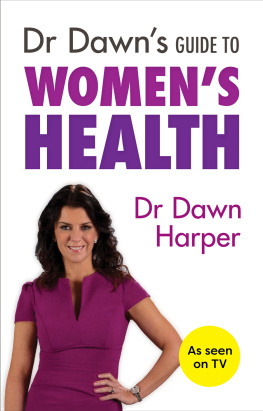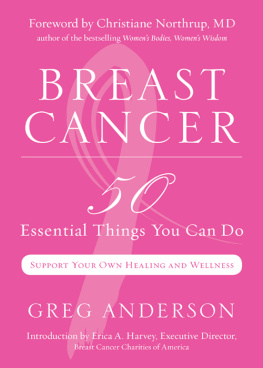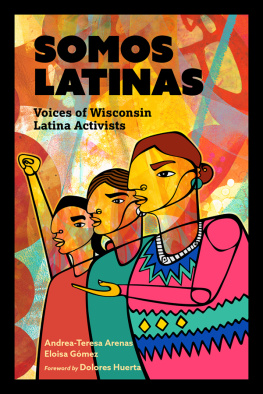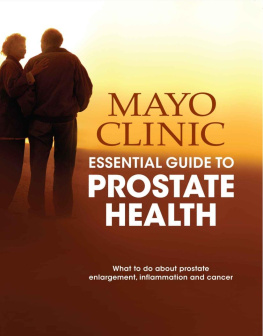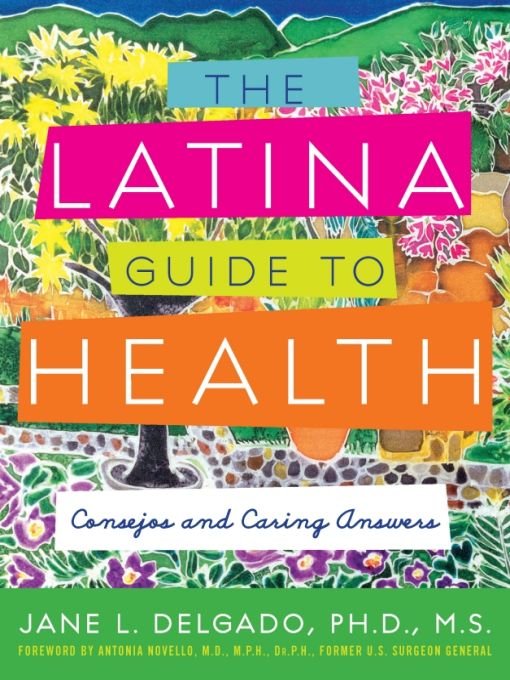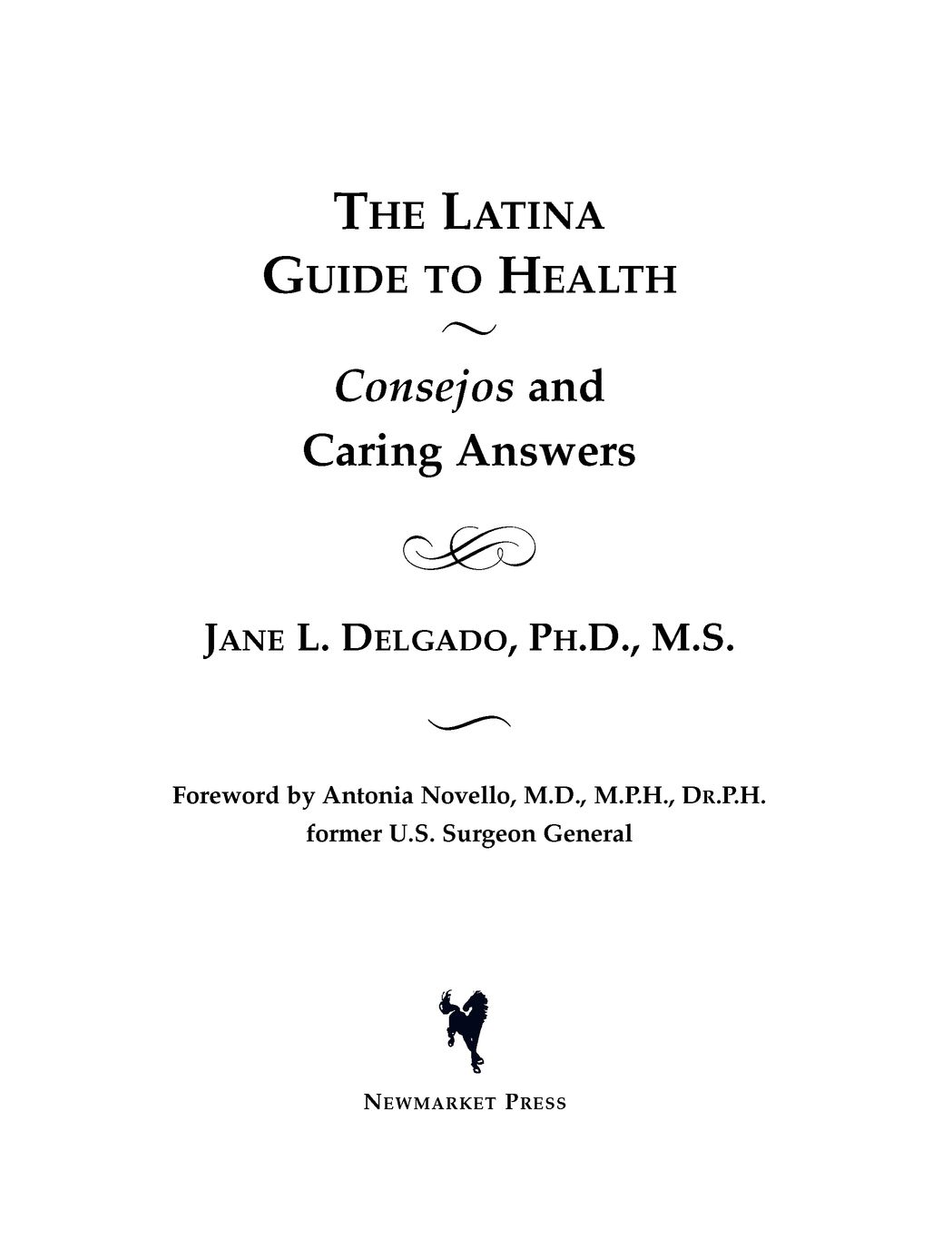Table of Contents
This book is designed to provide accurate and authoritative information in regard to the subject matter covered. It is not intended as a substitute for medical advice from a qualified physician. The reader should consult her medical, health, or other competent professional before adopting any of the suggestions in this book or drawing inferences from it.
The author and the publisher specifically disclaim all responsibility for any liability, loss, or risk, personal or otherwise, that is incurred as a consequence, directly or indirectly, of the use and application of any of the contents of this book.
MY MOTHER HAS ALWAYS BEEN MY ROLE MODEL. Her life at eighty-six is full of joy, laughter, friendship, and continuous education. I think there is no greater wish for any of us than to model such a life. I may have become Surgeon General of the United States and benefited from the finest of medical education, but it is my mother who taught me common sense and encouraged me to always provide for the common good. Likewise, throughout her life experiences, she has come to understand that health is about much more than medical systems. It is about knowledge, caring, giving, sharing, and choosing to treat ourselves and others as we want others to treat usbasically, con cario y respeto (with affection and respect).
The same answer to how my mother has lived her long life is ours to have. It is in the traditions of our culture, taking the time to care for ourselves, and then doing what is needed to care for others. In a way it is like being a comadre (friend) to others and helping them celebratein onelifes blessings. There is a great comfort and joy in knowing a true friend, one who is caring and understanding but above all is only a phone call, e-mail, or text message away. I am pleased to have this friend in Dr. Jane Delgado, and as a good comadre, I want to share her with you.
In The Latina Guide to Health, Dr. Delgado offers a life package, if you will, where advice filled with common sense is given. In this guide to health, Jane weaves together the everyday stories of character and wisdom of all types of hermanas (sisters) and Latinas and then presents the latest advances in science and medicine in a concise, informative, and easy-to-understand format. In this book our stories as sisters, daughters, mothers, wives, and partners are intertwined with love, affection, and truth, a way to show the world that our gender accomplishes the impossible and, most times, there is no one to give us credit.
In The Latina Guide to Health: Consejos and Caring Answers, Dr. Delgado gives us a caring and tender guide to health from a friend who understands our worries and fears and exposes our strengths. This book is advice you can trust and share.
Life takes all of us on different paths, but we all need a friend on that journey. Jane is one of my lifes most cherished comadres. I know you will find her guide useful and witty. It is a guide for your journey that will ease your path. Read it, and you will finally have a true friend.
ANTONIA COELLO NOVELLO, M.D., M.P.H, DR.P.H.
EXECUTIVE DIRECTOR, GOVERNMENT AFFAIRS
WOMEN AND CHILDRENS HEALTH POLICY
FLORIDA HOSPITAL FOR CHILDREN
FORMER U.S. SURGEON GENERAL
THIS GUIDE IS WRITTEN FOR YOULATINAS OF ALL AGES, sizes, family backgrounds, and family situations. I have spent my whole life working to improve the health of Hispanic women and their families. Today, as never before, there is adviceavisos y consejosfor our minds, bodies, and spirits that can help us to be healthier and happier than ever before.
I want to have a conversation with you, as I have had with so many Latinas I have met across the country and the Spanish-speaking world. Just as if we were talking over a chocolate caliente (hot chocolate) or caf con leche (coffee with milk), I want you to know that I am an honest, straightforward person who supports you for who you are while asking you to do the best you can for your health and happiness.
All of us need to hear and remind each other that it is okay to see the world in a different way because we are Latinas. Aguantando, our belief that to be good women we have to endure and hold everything together, is important to us. But sometimes we do it too much and end up neglecting or even hurting ourselves. When we have accurate information, when we see the truth, when we value ourselvesalong with our familieswe discover the hope and motivation to take care of our total well-being.
It is okay to see the world in a different way because we are Latinas.
As the president and CEO of the National Alliance for Hispanic Health, I oversee and manage programs throughout the United States that each year reach millions of people. During the past decade I have watched how many major leaps forward science has made and how much has changed in health care since I last wrote a book for Latinas in 2002. At the same time, the many women who have shared their stories with me have told me that their experiences with their own health have not reflected these changes. I became certain that whatever I would write next would build on their stories and my experiences.
I also knew that this book would be different because two of my comadres who had been vitally important to prior books for Latinas, Deborah Helvarg and Henrietta Villaescusa, were no longer alive. Both health professionals, they were well informed and not silent, and they had health insurance. Despite these facts, they both experienced the fissures of our uncharted health system. In some of my last conversations with each of them, they made it clear that I had to carry on our missiontheir lifes workto improve womens health. They inspired me to write The Latina Guide to Health for all of us trying to live our healthiest, happiest life and help our comadres do the same. In the stories and advice in this book, I hope I have been able to capture in some small part their love of life, wisdom, and devotion to friendship.
I must admit that while taking care of Deborah, I saw the dramatic shifts in the health care system that had occurred over the preceding decade. Hospitals were glad to have someone (me) stay in the room and help with the care, since they were so short staffed. There were innovative treatments on the horizon; but to get them, you had to meet the strict requirements of the clinical trial that had been constructed to validate the treatment. Cancer treatment was more tolerable, but for lung cancer the outcomes remained dismal. Hospice and palliative care were available; but in order to receive these services, you had to agree to forgo any treatment for your condition.
Deborah reinforced my belief that while science can answer some questions, the body-mind-spirit connection goes beyond the explanations of science. Deborahs enormous desire to spend one last Thanksgiving with her sons and all of us who made up her familia (family) helped her beat the odds regarding how long she would live. She died twelve days after a Thanksgiving feast with her sons she adored, plus her friends and other family members.
Making this book meaningful and medically sound took the support, belief, and work of many experts. Dr. Ken Blank (Capitol Womens Care) is a dedicated bilingual obstetriciangynecologist who gave up his weekends to review every word in this book and provide his knowledge and wisdom. There were also several generous colleagues who reviewed specific sections: Dr. Don Schumacher and Kathy Brandt (National Hospice and Palliative Care Organization), Dr. Jack Lewin (American College of Cardiology), Dr. Martin Seligman (University of Pennsylvania), Dr. Juan Enriquez (Excel Medical Ventures), Sandra Raymond (Lupus Foundation of America, Inc.), and Dr. Sandra Hernandez (San Francisco Foundation). All of these persons brought the best of science and clinical practice to bear while appreciating our reality: for Latinas, health is a complex mix of body, mind, and spirit.


